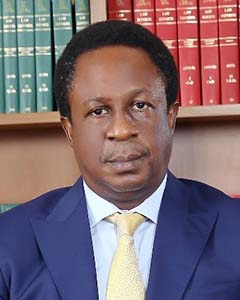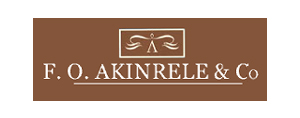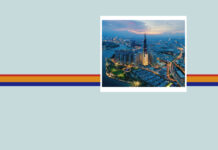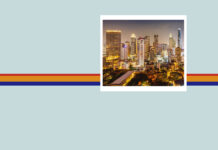Nigeria is among the most promising areas of growth in Africa and attracts numerous investors in the hydrocarbons, shipping, energy, mining, agro-allied, manufacturing and infrastructure sectors.
It is a federation of 36 states and one federal capital territory. Each of the states is a semi-autonomous political unit that shares power and foreign direct investment (FDI) with the federal government as enumerated under the constitution of the Federal Republic of Nigeria.
Nigeria intends to diversify its economy away from oil by building a competitive manufacturing sector, which should facilitate integration into global value chains and boost productivity.
Some of the country’s main advantages are a partially privatised economy, an advantageous taxation system, significant natural resources, low cost of labour, and the growth of free-trade zones (in Calabar, the capital of Cross River state, and the port city of Lagos).
However, the business terrain can be challenging, and the formation of good preliminary legal and investment strategies with experienced legal advisers, coupled with thorough due diligence investigations, are essential tools in achieving success in any proposed venture.
Investment treaties
Nigeria has signed bilateral investment agreements with Algeria, Bulgaria, China, Egypt, France, Finland, Germany, Italy, Jamaica, Montenegro, the Netherlands, South Korea, North Korea, Romania, Serbia, South Africa, Spain, Sweden, Switzerland, Taiwan, Turkey, Uganda and the UK.
Four of these treaties (with France, the Netherlands, South Korea and the UK) have been ratified by both parties. Nigeria has also expressed an interest in negotiating a bilateral investment treaty with the US.

Partner
Tel: +234 813 474 2333
Email: dolapo_akinrele@foakinrele.com
Nigeria’s main trading bloc in Africa has been the Economic Community of West African States since its establishment in 1975, consisting of 15 countries with a mandate of promoting economic integration in all fields of activity of the constituting countries.
An additional and relatyively new trading bloc in Africa that Nigeria belongs to is the African Continental Free Trade Area. Its main objectives are cross-border co-operation and frictionless trade between African countries.
This new zone officially came into being on 30 May 2019, after a minimum threshold of 22 countries confirmed that they had ratified the 2018 founding treaty by re-enacting it verbatim into their national laws. The bilateral investment treaty between Nigeria and South Korea, and other multilateral treaties create important access points into Nigeria and other African markets.
Investment methodology
The organised private sector remains the primary driver of investment. However, FDI can come by way of public sector projects through federal government agencies.
Additionally, successive economic reforms have given the impetus to state governments to grow in stature as gatekeepers to FDI into Nigeria. It is now common to hear of state governments introducing specialised agencies to facilitate and co-ordinate investment inflows.

Associate
Tel: +2341 4630 4702
Email: adewale_sontan@foakinrele.com
Some states have also floated development-focused corporate entities in which they have controlling stakes, and are pursuing regional economic integration strategies. FDI flows are ordinarily made via the establishment of a company (or acquisition of shares in a registered company) with the Corporate Affairs Commission (CAC). Every company with foreign participation must also be registered with the Nigerian Investment Promotion Commission (NIPC). A business licence and an expatriate quota must be obtained from the Ministry of Interior, while the financial statements of the company must be prepared annually and submitted to
the CAC.
Foreign portfolio investments represent another pathway of foreign investment into Nigeria, through the purchase of securities and other financial assets by foreign investors interested in short-term investments, or investments that can be disposed of easily once the investor decides to exit.
Foreign portfolio investments can be made in a variety of shares or other securities that are traded on the Nigerian Stock Exchange (NSE) and the Financial Markets Dealers Quotations (FMDQ) Securities Exchange.
Relevant agencies and laws
The Nigerian Investment Promotion Commission (NIPC) Act. The NIPC is the nominated agency of the federal government to co-ordinate and monitor all investment promotion activities, such as initiating and supporting measures that shall enhance the investment climate in the country for both Nigerian and non-Nigerian investors.
The commission operates a one-stop investment centre, where it provides services for granting business entry permits, licences, authorisations and incentives. Other key investment aid agencies include the Small and Medium Enterprises Development Agency of Nigeria, the Nigeria Export Processing Zones Authority and the Nigerian Export Promotion Council.
Foreign Exchange (Monitoring and Miscellaneous Provisions) Act. Chapter F34 (Decree No 17 of 1995) Laws of the Federation of Nigeria. This act regulates foreign exchange transactions in the country by establishing an autonomous foreign exchange market, and provides for the monitoring and supervision of the transactions conducted in the market. With the minister’s approval, the Central Bank of Nigeria issues, from time to time, guidelines to regulate the procedures for transactions in the market and other matters that may be deemed appropriate for the effective operation of the market.

Associate
Tel: +2341 4630 4702
Email: abraham_otene@foakinrele.com
Companies and Allied Matters Act (CAMA) 2020. This is the principal legislation regulating business in Nigeria. It was amended and re-enacted in 2020. The CAMA provides, among other things, for the nature of business organisations permitted in the country, incorporation or registration of companies and other business types, filing of statutory returns, and general corporate governance. A major highlight of the CAMA is the incorporation of a one-member company, limited partnership and limited liability partnerships.
Immigration Act. This act consolidates and amends the law of immigration. It applies to foreigners entering, staying or leaving the country. It controls the issuance of passports, and resident and work permits. Under the law, the Comptroller General of Immigration is empowered to issue a Nigerian residence permit, under the Federal Ministry of Interior’s supervision, to a foreigner.
The Nigerian resident or work permit is officially known as the Combined Expatriate Residence Permit and Aliens Card (CERPAC). The CERPAC grants a foreigner permission to live and work for up to two years, which is subject to renewal and validity of the expatriate quota. By virtue of section 18(2) of the Immigration Act, 2015, a foreign national granted a residence permit does not require an entry visa.
National Office for Technology Acquisition and Promotion (NOTAP) Act. The NOTAP Act, 2004, was established to govern the entrance of foreign technology into the Nigerian economy and to devise acceptable mechanisms of adapting the acquired technology. The mandate is carried out by evaluating, registering and monitoring all technology transfer agreements made by Nigerian entrepreneurs, institutions and international technology partners. The NOTAP assesses agreements based on their legal, economic and technological value to the economy.
Investment and Securities Act, 2007. This act regulates the capital market to ensure the protection of investors to maintain a fair, efficient and transparent market, to reduce systemic risks, and for related matters. The Securities and Exchange Commission is the apex regulatory authority for the Nigerian capital market.
Investment incentives
The Companies Income Tax Act (CITA). The Nigerian tax regime provides for a variety of tax obligations for individuals and companies doing business in the country. The most prominent of these taxes is under the CITA, which imposes a tax rate on companies of 30% of the profit of the company, subject to a list of allowable deductions and donations.
There is also a number of tax incentives and investment guarantees that make the country an attractive destination for foreign investments. Such incentives apply to investments that involve raw materials utilisation, gas utilisation, tourism, research and development, infrastructure, labour intensive modes of production, local value-added in the engineering industry, in-plant training, export-oriented industry, and investments in economically disadvantaged areas.
The NIPC Act. The NIPC Act also makes provisions for certain incentives and guarantees. Under section 24 of the act, a foreign investor registered with the commission is guaranteed unconditional transferability of funds, through an authorised dealer, of its dividends, profits and payments in respect of loan servicing, where a foreign loan has been obtained, and the remittance of proceeds in the event of sale or liquidation of
the enterprise.
Under section 25 of the act, investors are also guaranteed protection of their enterprises from nationalisation or expropriation by the government, and where expropriation is made, it must be for the national interest or public purpose. The investor’s right to approach the court for a determination of his/her rights, and fair and adequate compensation, is also secured.
Where there is a dispute between the investor and the government that cannot be amicably settled by mutual discussions, reference may be made to arbitration. Where the Nigerian government and the investor’s country have a bilateral agreement on investment protection, the arbitration will be within the framework of the agreement.
Where there is no such bilateral agreement, then the arbitration will be within the framework of any multilateral agreement on investment protection to which both countries are parties. The International Centre for Settlement of Investment Disputes Convention will apply.
Adedolapo Akinrele is a partner at FO Akinrele & Co. You can contact him at +234 813 474 2333 and dolapo_akinrele@foakinrele.com
Adewale Sontan is an associate at FO Akinrele & Co. You can contact him at +2341 4630 4702 and adewale_sontan@foakinrele.com
Abraham Otene is an associate at FO Akinrele & Co. You can contact him at +2341 4630 4702 and abraham_otene@foakinrele.com

FO Akinrele & Co
188 Awolowo Road, SW Ikoyi, Lagos
Contact details:
Tel: +234 1 4630 4702, 4630283
Email: info@foakinrele.com






























